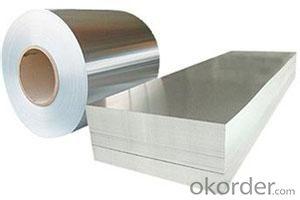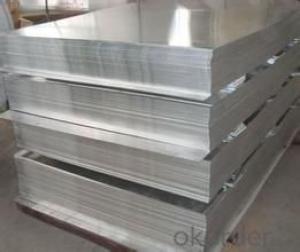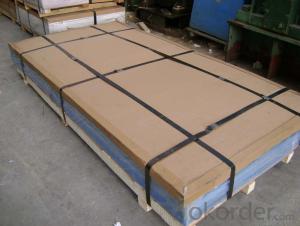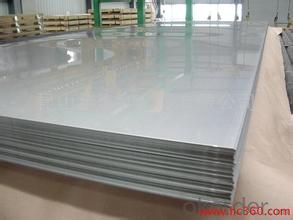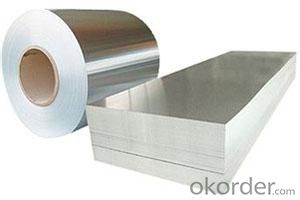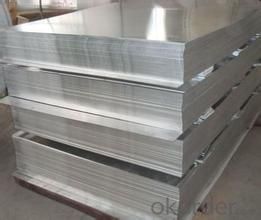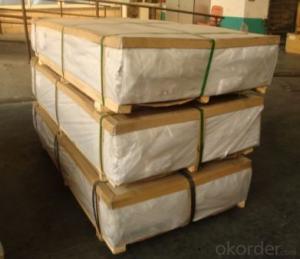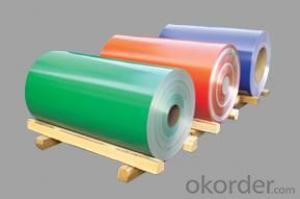Laserable Mill Finished Aluminum Sheets, Strips, and Plates Hot Wholesale in China
- Loading Port:
- China Main Port
- Payment Terms:
- TT OR LC
- Min Order Qty:
- -
- Supply Capability:
- -
OKorder Service Pledge
OKorder Financial Service
You Might Also Like
Aluminium is a relatively soft,durable, lightweight, ductile and malleablemetal with appearance ranging from silvery to dull gray,depending on the surface roughness. It is nonmagnetic and does not easilyignite. A fresh film of aluminium serves as a good reflector (approximately92%) of visible light and an excellent reflector (as much as98%) of medium and far infrared radiation. The yield strength of pure aluminium is 7–11 MPa,while aluminium alloys have yield strengths ranging from200 MPa to 600 MPa. Aluminium has about one-third the density and stiffnessof steel. It iseasily machined,cast, drawn and extruded.
Alu Plate
Alloy: AA1050, 1060, 1100, AA3003, 3005, 3015, 5052, 5754, 5083,8011,etc
Temper:H14/16/18/22/24/32,HO etc.
Thickness:0.2mm—100mm
Width:100mm—2300mm (Can be slitted)
Application: Foil stock, Circles, Roofing, Canstock, Marine plate,Anti-sliperypurpose in vehicles, packing and appliance.
Features:
1. Excellent quality of products
2. Quick delivery
3. Best service to clients
4. BV,SGS avalible
5. No buckle o waveness
6. Tension leveling
7. Certificate of Origin
8. Form A,E
Packaging Detail: Carton ,Wooden pallet with plastic protection packing,standard seaworthy packing or as your request.
ProductionCapacity:
AnnualProduction capacity of 600,000 tons.
Products areexported to United States, Canada, U.A.E, Brazil, Mexico,Thailand, Vietnam,Nigeria etc, over 100 countries andregions all over the world.
Coveredfactories with full production line
CNBM aluminumproduction base is comprised of 18 aluminumannealers, 10 coil and foilmills, 4 continuous production lines, 2hot rolling production line and 3prepainted lines.
FAQ:
1. What is the form of payment?
Normally 30% TT, L/C
2. Type of quotation?
FOB, CFR, CIF
3. Port of loading?
Shanghai port
4. Delivery time?
30 day after client’s deposit
- Q: can the oxide film on the surface of aluminum sheet prevent the erosion of acid liquid? Why?
- yes, acid can react with aluminum oxide , generating salt and water, but its anti-corrosion will be stronger if oxide film on the surface is enough dense.
- Q: Is it possible to utilize aluminum sheets in the construction of environmentally friendly or sustainable buildings?
- <p>Yes, aluminum sheets can be used for green building projects. They are lightweight, strong, and durable, which reduces the amount of material needed and the energy consumed in transportation. Aluminum is also 100% recyclable, meaning it can be repurposed without losing quality, reducing waste and the need for new raw materials. Additionally, aluminum has a high reflectivity, which can help in reducing heat absorption and thus lowering cooling costs in buildings. These properties make aluminum a sustainable choice for green building initiatives.</p>
- Q: Are the aluminum sheets suitable for signage or advertising purposes?
- Yes, aluminum sheets are highly suitable for signage or advertising purposes. Aluminum is lightweight, durable, and weather-resistant, making it ideal for outdoor use. Additionally, aluminum sheets can be easily shaped, printed on, and customized according to specific design requirements, making them a popular choice for various signage and advertising applications.
- Q: Can aluminum sheets be used for interior design purposes?
- Yes, aluminum sheets can definitely be used for interior design purposes. Aluminum is a versatile material that offers many benefits for interior design applications. It is lightweight, durable, and resistant to corrosion, making it ideal for various design elements such as wall coverings, ceiling panels, backsplashes, and room dividers. Aluminum sheets can be easily customized and fabricated into different shapes, sizes, and finishes, allowing for endless design possibilities. Additionally, aluminum is a sustainable and eco-friendly material, as it is highly recyclable. Its sleek and modern look adds a contemporary touch to any interior design project. Overall, aluminum sheets have become a popular choice for interior designers due to their functionality, aesthetics, and sustainability.
- Q: Are aluminum sheets suitable for automotive body panels?
- Yes, aluminum sheets are suitable for automotive body panels. Aluminum is lightweight, corrosion-resistant, and strong, making it an ideal material for manufacturing car body panels. It helps improve fuel efficiency, enhances performance, and reduces overall vehicle weight, making it a popular choice among automakers.
- Q: Can aluminum sheets be anodized for improved corrosion resistance?
- Aluminum sheets have the capability to undergo anodization in order to enhance their resistance to corrosion. Anodizing, an electrochemical process, is utilized to generate a protective oxide layer on the surface of the aluminum. This oxide layer effectively shields the aluminum from corrosion and deterioration. Throughout the anodization process, the aluminum sheet is immersed in an electrolyte bath and an electric current is applied. As a result, the aluminum bonds with oxygen ions, forming a dense and substantial aluminum oxide layer on the surface. This oxide layer acts as a barrier, preventing moisture and other harmful substances from reaching the underlying metal. Anodized aluminum sheets possess improved strength, extended lifespan, and heightened resistance to corrosion, making them highly suitable for a wide range of applications such as architecture, automotive manufacturing, and aerospace industries. Furthermore, anodized aluminum sheets can be dyed in numerous colors, offering not only enhanced corrosion resistance but also aesthetic appeal.
- Q: Are the aluminum sheets suitable for manufacturing power distribution panels?
- Absolutely, power distribution panels can be manufactured using aluminum sheets. Aluminum is an exceptional material choice for various industrial applications, including power distribution panels, due to its lightweight, durability, and resistance to corrosion. Not only can aluminum sheets effectively handle high electrical currents, but they also efficiently dissipate heat, ensuring a safe and efficient power distribution system. Furthermore, aluminum is widely accessible and cost-effective in comparison to alternatives like copper. Consequently, aluminum sheets are an excellent option for manufacturing power distribution panels.
- Q: How do aluminum sheets perform in terms of thermal expansion and contraction?
- Aluminum sheets possess a relatively high coefficient of thermal expansion, causing them to expand and contract more than most other materials when subjected to heat or cold. The coefficient of thermal expansion for aluminum is approximately 23 x 10^-6 per degree Celsius. Consequently, for each degree Celsius rise in temperature, aluminum expands by 23 millionths of its original size. This thermal expansion and contraction characteristic of aluminum renders it suitable for various applications where temperature fluctuations are anticipated. For example, in the construction industry, aluminum sheets are commonly utilized for roofing and cladding purposes. These sheets can endure the thermal stresses resulting from changing temperatures without experiencing significant warping or distortion. Additionally, this particular attribute of aluminum makes it an ideal choice for the production of items such as cookware and heat sinks. Aluminum cookware heats up rapidly and evenly due to its high thermal conductivity, while expanding uniformly to prevent warping or deformation when exposed to heat. Similarly, aluminum heat sinks effectively dissipate heat generated by electronic components as they can accommodate thermal expansion without compromising their structural integrity. However, it is important to acknowledge that although aluminum sheets possess favorable thermal expansion and contraction properties, extreme temperature changes can still result in some dimensional alterations. Therefore, careful consideration of the expected temperature variations is essential when designing and utilizing aluminum sheets to ensure their optimal performance and durability.
- Q: How does aluminum sheet perform in outdoor applications?
- Aluminum sheet performs exceptionally well in outdoor applications due to its inherent corrosion resistance and durability. It is highly resistant to rust and can withstand exposure to harsh weather conditions, making it ideal for outdoor structures, signage, and cladding. Additionally, aluminum sheets can be coated or painted to enhance their weather resistance and aesthetic appeal. Overall, aluminum sheet is a reliable and long-lasting material for various outdoor applications.
- Q: What are the safety precautions when working with aluminum sheet?
- When working with aluminum sheet, it is important to take certain safety precautions. These include wearing personal protective equipment such as gloves, safety glasses, and a dust mask to protect against potential hazards. It is also advisable to work in a well-ventilated area to avoid inhaling any fumes or dust particles. Additionally, using appropriate tools and machinery specifically designed for handling aluminum sheets is essential to prevent accidents or injuries. Finally, proper handling and storage of aluminum sheets, ensuring they are stacked securely and avoiding any sharp edges, can help minimize the risk of accidents or damage.
Send your message to us
Laserable Mill Finished Aluminum Sheets, Strips, and Plates Hot Wholesale in China
- Loading Port:
- China Main Port
- Payment Terms:
- TT OR LC
- Min Order Qty:
- -
- Supply Capability:
- -
OKorder Service Pledge
OKorder Financial Service
Similar products
Hot products
Hot Searches
Related keywords

